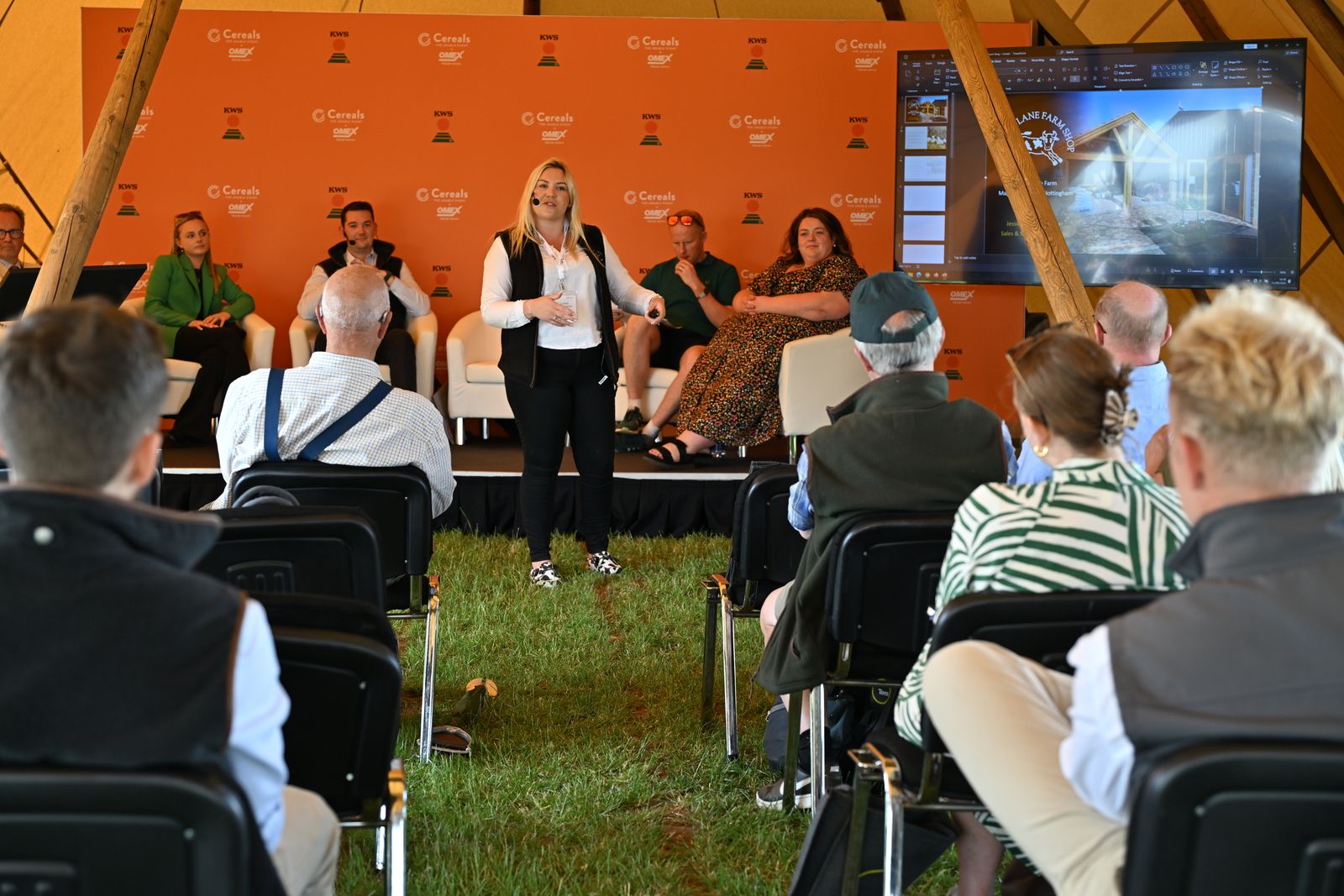Farmers: Time to take control

Farmers must take control of their own businesses if they are to succeed in a future with limited government support. That’s according to speakers at the Cereals Event last week, which attracted around 20,00 visitors over a packed two days of seminars, working demonstrations and variety crop plots.
Although the Chancellor's spending review was relatively benign in terms of overall budget for farming and the environment, the direction of travel is clear, said Jeremy Moody, secretary and adviser to the Central Association of Agricultural Valuers (CAAV).
Ministerial language makes it plain that farmers must look at their operations as businesses and not rely on future support. “Defra is realising it can't afford all the environmental goals it accepted as its inheritance,” he said. “The public finances appear to be in a worse position than last summer. And we know less about environmental management schemes now than we did two years ago.”
There is next to no margin in the spending review, warned Mr Moody. “We will need more changes, with increased tax and reduced spending to come. The sums just don't add up.”
Changes to the Sustainable Farming Incentive (SFI) suggest a move away from a broad and shallow scheme to targeting small farms, national parks and Areas of Outstanding Natural Beauty. But will that also mean active encouragement of farming productive land with appropriate tax breaks and incentives? In future, it's likely that less profitable farmers will let land out, giving opportunities for the best farmers to produce food profitably, he predicted.
Set against a backdrop of new trade deals, a changing climate and global instability, the most important thing, he said, will be for farmers to manage change before it manages them. “We will have thriving businesses in the 2030s and 2040s, which are so often created in times of adversity, like now.”
John Fuller OBE, chair of Nitraflow Fertiliser, urged farmers to explore sustainable intensification options rather than let Defra drag them down. He welcomed the review into fairness in the supply chain, which may tackle unwanted smoke and mirrors and help protect businesses from unfair practices.
Jamie Burrows, NFU chair of the combinable crops board, said the review wouldn’t change the price of grain but could provide more transparency. “There will be more clarity over input costs and why we are paying what we pay.”
Meanwhile, the All-Party Parliamentary Group (APPG) for Agriculture and Food for Development joined industry leaders to discuss its recently launched vision document, outlining ambitions to reframe UK farming policy, regulation, and the research agenda. The visit aimed to foster dialogue around delivering a more forward-looking and resilient future for agriculture.
“The current direction of farm policy isn't doing enough to encourage farmers to adopt available technology and operate as efficiently as they could,” explained co-ordinator Daniel Pearsall.
The 30:50:50 initiative sets an ambitious goal: To produce 30% more food by 2050 while halving agriculture’s environmental impact. “We want to reframe the regulatory agenda to support farmers in producing more from less - by making it easier to adopt the latest innovations and technologies,” said Mr Pearsall.
“It’s not rocket science. All farmers want to do is produce food efficiently. Our message is simple: Focus on what you can control, producing as efficiently and at as high a value as possible.”
|https://cdn.asp.events/CLIENT_Haymarke_CB6BD562_5056_B731_4CF17C014C89B355/sites/cereals-2025/media/libraries/exhibitors/MF-logo-1-.jpg/fit-in/640x9999/filters:no_upscale())
|https://cdn.asp.events/CLIENT_Haymarke_CB6BD562_5056_B731_4CF17C014C89B355/sites/cereals-2025/media/libraries/exhibitors/EFM-1-.jpg/fit-in/640x9999/filters:no_upscale())
|https://cdn.asp.events/CLIENT_Haymarke_CB6BD562_5056_B731_4CF17C014C89B355/sites/cereals-2025/media/libraries/exhibitors/AF-logo-1-.jpg/fit-in/640x9999/filters:no_upscale())
|https://cdn.asp.events/CLIENT_Haymarke_CB6BD562_5056_B731_4CF17C014C89B355/sites/cereals-2025/media/libraries/exhibitors/farm-contractor-retina2.png/fit-in/640x9999/filters:no_upscale())
|https://cdn.asp.events/CLIENT_Haymarke_CB6BD562_5056_B731_4CF17C014C89B355/sites/cereals-2025/media/libraries/exhibitors/ISUZU UK LTD_logo.png/fit-in/640x9999/filters:no_upscale())
|https://cdn.asp.events/CLIENT_Haymarke_CB6BD562_5056_B731_4CF17C014C89B355/sites/cereals-2025/media/libraries/exhibitors/the-central-association-of-agricultural-valuers.png.png/fit-in/640x9999/filters:no_upscale())
|https://cdn.asp.events/CLIENT_Haymarke_CB6BD562_5056_B731_4CF17C014C89B355/sites/cereals-2025/media/libraries/exhibitors/e5fe77f9-2834-11ed-b1330a410bd8e1d9-logo.jpg/fit-in/640x9999/filters:no_upscale())
|https://cdn.asp.events/CLIENT_Haymarke_CB6BD562_5056_B731_4CF17C014C89B355/sites/cereals-2025/media/libraries/exhibitors/451f51e8-b7dc-11ef-b52-06bd0f937899-logo.jpg/fit-in/640x9999/filters:no_upscale())
|https://cdn.asp.events/CLIENT_Haymarke_CB6BD562_5056_B731_4CF17C014C89B355/sites/cereals-2025/media/libraries/exhibitors/sykes-holiday-cottages.jpg.jpg/fit-in/640x9999/filters:no_upscale())
|https://cdn.asp.events/CLIENT_Haymarke_CB6BD562_5056_B731_4CF17C014C89B355/sites/cereals-2025/media/libraries/exhibitors/uk-agritech-centre.png.png/fit-in/640x9999/filters:no_upscale())
|https://cdn.asp.events/CLIENT_Haymarke_CB6BD562_5056_B731_4CF17C014C89B355/sites/cereals-2025/media/libraries/exhibitors/Tees_POS_RGB.jpg/fit-in/640x9999/filters:no_upscale())
|https://cdn.asp.events/CLIENT_Haymarke_CB6BD562_5056_B731_4CF17C014C89B355/companyProfiles/19AFED0-8CFA-4C6B-A02F-EE49E7FE9A24-logo.jpg/fit-in/640x9999/filters:no_upscale())
|https://cdn.asp.events/CLIENT_Haymarke_CB6BD562_5056_B731_4CF17C014C89B355/sites/cereals-2025/media/libraries/exhibitors/PREMIUM CROPS_Logo.jpg/fit-in/640x9999/filters:no_upscale())
|https://cdn.asp.events/CLIENT_Haymarke_CB6BD562_5056_B731_4CF17C014C89B355/sites/cereals-2025/media/libraries/exhibitors/5f0c9802-b7dc-11ef-b52-06bd0f937899-logo.jpg/fit-in/640x9999/filters:no_upscale())
|https://cdn.asp.events/CLIENT_Haymarke_CB6BD562_5056_B731_4CF17C014C89B355/companyProfiles/FF5EBF7-26C6-4F39-9F42-C694FEBA2D7F-logo.png/fit-in/640x9999/filters:no_upscale())
|https://cdn.asp.events/CLIENT_Haymarke_CB6BD562_5056_B731_4CF17C014C89B355/sites/cereals-2025/media/libraries/exhibitors/NROSO_Logo.png/fit-in/640x9999/filters:no_upscale())
|https://cdn.asp.events/CLIENT_Haymarke_CB6BD562_5056_B731_4CF17C014C89B355/sites/cereals-2025/media/libraries/exhibitors/NITRASOL_logo.png/fit-in/640x9999/filters:no_upscale())
|https://cdn.asp.events/CLIENT_Haymarke_CB6BD562_5056_B731_4CF17C014C89B355/sites/cereals-2025/media/libraries/exhibitors/NIAB-CORRECT-LOGO.png/fit-in/640x9999/filters:no_upscale())
|https://cdn.asp.events/CLIENT_Haymarke_CB6BD562_5056_B731_4CF17C014C89B355/sites/cereals-2025/media/libraries/exhibitors/NAAC_Logo_final.jpg/fit-in/640x9999/filters:no_upscale())
|https://cdn.asp.events/CLIENT_Haymarke_CB6BD562_5056_B731_4CF17C014C89B355/sites/cereals-2025/media/libraries/exhibitors/KWS_Logo_RGB-2-.png/fit-in/640x9999/filters:no_upscale())
|https://cdn.asp.events/CLIENT_Haymarke_CB6BD562_5056_B731_4CF17C014C89B355/sites/cereals-2025/media/libraries/sponsors-list/Farmers-Weekly.png/fit-in/640x9999/filters:no_upscale())
|https://cdn.asp.events/CLIENT_Haymarke_CB6BD562_5056_B731_4CF17C014C89B355/sites/cereals-2025/media/libraries/exhibitors/9c88e4c0-7794-11ec-910-06e21988b83f-logo.jpg/fit-in/640x9999/filters:no_upscale())
|https://cdn.asp.events/CLIENT_Haymarke_CB6BD562_5056_B731_4CF17C014C89B355/sites/cereals-2025/media/libraries/exhibitors/CERES RURAL_logo.png/fit-in/640x9999/filters:no_upscale())
|https://cdn.asp.events/CLIENT_Haymarke_CB6BD562_5056_B731_4CF17C014C89B355/sites/cereals-2025/media/libraries/exhibitors/56aed295-bb58-11ec-910306e21988b83f-logo.png/fit-in/640x9999/filters:no_upscale())